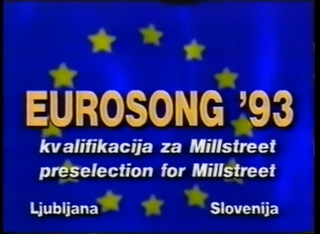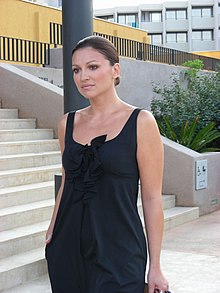
The Eurovision Song Contest 1993 was the 38th edition of the Eurovision Song Contest. It took place in Millstreet, Ireland, following the country's victory at the 1992 contest with the song "Why Me?" by Linda Martin. Organised by the European Broadcasting Union (EBU) and host broadcaster Radio Telefís Éireann (RTÉ), the contest was held at the Green Glens Arena on 15 May 1993 and was hosted by Irish TV-reporter Fionnuala Sweeney, marking the first time since the 1987 contest that just one presenter had hosted the contest.

Croatia participated in the Junior Eurovision Song Contest five times, and won the inaugural edition in 2003. Croatian broadcaster Hrvatska radiotelevizija (HRT), a member organisation of the European Broadcasting Union (EBU), were responsible for the country's participation. Croatia participated in the first four editions, from 2003 to 2006, organising a national final to select the country's entrant. The first representative to participate for Croatia was Dino Jelusić with the song "Ti si moja prva ljubav", which finished in first place out of sixteen participating entries, with a score of 134 points. Croatia was absent from the contest between 2007 and 2013, but HRT decided to return to the contest in 2014 and selected their entry internally. In 2014, Josie finished in last place for Croatia with the song "Game Over", after which HRT again withdrew from competing the following year.

Slovenia has participated in the Eurovision Song Contest 27 times since its debut in 1993, having hosted a qualification round in Ljubljana for seven countries due to the influx of new nations wishing to join the Eurovision Song Contest. Having only missed the event twice in 1994 and 2000 due to the relegation rule after a poor average score in the 1990s, Slovenia's best result is seventh position achieved on two occasions; in 1995 with "Prisluhni mi" performed by Darja Švajger and in 2001 with Nuša Derenda and "Energy". Since the introduction of the semi-finals in 2004, Slovenia has qualified for the final on seven occasions. As of 2022, Slovenia has not made it to the top ten since their seventh place finish in 2001, only making it to the thirteenth position in 2002 and 2011.

Yugoslavia participated in the Eurovision Song Contest 27 times, debuting in 1961 and competing every year until its last appearance in 1992, with the exceptions of 1977–1980 and 1985. Yugoslavia won the 1989 contest and hosted the 1990 contest.
Estonia attempted to enter the Eurovision Song Contest 1993, the first time the country tried to enter the Eurovision Song Contest. However, as Estonia was one of seven countries who wished to join the Eurovision Song Contest for the first time in 1993, a pre-selection was held for the first time to reduce this number to three countries who would compete in the final of the Contest in May, held in Millstreet, Ireland.

Croatia has participated in the Eurovision Song Contest 27 times since making its debut at the 1993 contest. Their entry has since 1993, excluding from 2012 to 2018, been selected at the Dora pop festival, an event organised by the national public broadcaster Croatian Radiotelevision (HRT). Croatia's best result in the contest is a fourth-place finish in 1996 and 1999.

Kvalifikacija za Millstreet was a televised song contest held as a qualifying round for the Eurovision Song Contest 1993. Organised by the European Broadcasting Union (EBU) and host broadcaster Radiotelevizija Slovenija, the contest was held on 3 April 1993 in Studio 1 of Televizija Slovenija in Ljubljana, Slovenia and presented by Slovenian television presenter Tajda Lekše.
Croatia competed in the Eurovision Song Contest 1999, held in Jerusalem. The Croatian entry for the contest was Doris Dragović with the song "Marija Magdalena".
Yugoslavia participated for the last time in the Eurovision Song Contest 1992, held in Malmö, Sweden as the Federal Republic of Yugoslavia. The last Yugoslav representative was Extra Nena with the song "Ljubim te pesmama".
Croatia participated in the Eurovision Song Contest 2009 with the song "Lijepa Tena" written by Tonči Huljić and Vjekoslava Huljić. The song was performed by Igor Cukrov featuring Andrea. The Croatian broadcaster Croatian Radiotelevision (HRT) organised the national final Dora 2009 to select the Croatian entry for the 2009 contest in Moscow, Russia. A total of twenty-four entries competed in the national final which consisted of two shows: a semi-final and a final. In the semi-final on 27 February 2009, six entries qualified to compete in the final on 28 February 2009 alongside ten pre-qualified songs. In the final, "Lijepa Tena" performed by Igor Cukrov was selected as the winner following the combination of votes from a six-member jury panel and a public televote.
Slovenia made its debut to the Eurovision Song Contest in 1993, having previously competed as part of Yugoslavia. The Slovene broadcaster Radiotelevizija Slovenija (RTVSLO) held a national final to select the first independent Slovene entry for the Eurovision Song Contest.
Bosnia and Herzegovina made their début at the Eurovision Song Contest 1993 in Millstreet, Ireland. Fazla represented Bosnia and Herzegovina with the song "Sva bol svijeta". The lyrics of the song describe the Bosnian War occurring at that time in Bosnia and Herzegovina, which gripped the entire country at the time. They finished in 16th place with 27 points.
Croatia was represented at the Eurovision Song Contest 1997 by E.N.I. with the song "Probudi me". The quartet were the winners of Dora 1997, which selected the fifth Croatian entry for the contest.
Croatia participated in the Eurovision Song Contest 2010 with the song "Lako je sve" written by Branimir Mihaljević, Pamela Ramljak and Neda Parmać. The song was performed by the group Feminnem, which had previously represented Bosnia and Herzegovina in the Eurovision Song Contest in 2005 where they placed fourteenth with the song "Call Me". The Croatian broadcaster Croatian Radiotelevision (HRT) organised the national final Dora 2010 to select the Croatian entry for the 2010 contest in Oslo, Norway. A total of twenty-four entries competed in the national final which consisted of two shows: a semi-final and a final. In the semi-final on 5 March 2010, eight entries qualified to compete in the final on 6 March 2010 alongside eight pre-qualified songs. In the final, "Lako je sve" performed by Feminnem was selected as the winner following the combination of votes from a nine-member jury panel and a public televote.
Romania attempted to debut in the Eurovision Song Contest 1993, held that year in Millstreet, Ireland, being one of seven countries interested in taking part in the contest for the first time. A national final, Selecția Națională 1993 organized by Romanian Television (TVR), was held on 16 January 1993, and "Nu pleca", written and performed by the Romanian singer Dida Drăgan and composed by Adrian Ordean, was selected to be the Romanian entry. For a place in the finals of the contest, Romania had to compete in a pre-qualifying round, Kvalifikacija za Millstreet, that took place in Ljubljana, Slovenia. The song ranked last, and so failed to qualify for the finals in Ireland. Predominantly negative reactions from Romanian media followed as a result of Drăgan's poor performance.
Croatia participated in the Eurovision Song Contest 2001 with the song "Strings of My Heart" written by Tonči Huljić, Vjekoslava Huljić and Ante Pecotić. The song was performed by Vanna. The Croatian broadcaster Croatian Radiotelevision (HRT) organised the national final Dora 2001 to select the Croatian entry for the 2001 contest in Copenhagen, Denmark. Twenty entries competed in the national final on 4 March 2001 and "Strune ljubavi" performed by Vanna was selected as the winner following the combination of votes from five regional juries, a six-member expert jury, a regional televote and an online vote. The song was later translated from Croatian to English for the Eurovision Song Contest and was titled "Strings of My Heart".
Croatia participated in the Eurovision Song Contest 2012 with the song "Nebo" written and performed by Nina Badrić, who was selected internally by the Croatian broadcaster Croatian Radiotelevision (HRT) on 10 January 2012 to represent Croatia at the 2012 contest in Baku, Azerbaijan. Her song Nebo" was presented to the public on 18 February 2012 during the special programme Dora 2012 - Idemo na Eurosong s Ninom!.
Croatia participated in the Eurovision Song Contest 2013 with the song "Mižerja" written by Goran Topolovac. The song was performed by the group Klapa s Mora, which was selected internally by the Croatian broadcaster Croatian Radiotelevision (HRT) on 11 February 2013 to represent Croatia at the 2013 contest in Malmö, Sweden. Their song "Mižerja" was presented to the public on 27 February 2013 during a live streamed press conference.
Croatia originally planned to participate in the Eurovision Song Contest 2020 with the song "Divlji vjetre" written by Ante Pecotić. The song was performed by Damir Kedžo. The Croatian broadcaster Croatian Radiotelevision (HRT) organised the national final Dora 2020 to select the Croatian entry for the 2020 contest in Rotterdam, Netherlands. Fourteen entries competed in the national final on 29 February 2020 and "Divlji vjetre" performed by Damir Kedžo was selected as the winner following the combination of votes from five regional juries and a public televote.
Croatia participated in the Eurovision Song Contest 2022 in Turin, Italy, with "Guilty Pleasure" performed by Mia Dimšić. The Croatian broadcaster Croatian Radiotelevision (HRT) organised the national final Dora2022 to select the Croatian entry for the 2022 contest. Fourteen entries competed in the national final on 19 February 2022 and "Guilty Pleasure" performed by Mia Dimšić was selected as the winner following the combination of votes from ten regional juries and a public televote.





